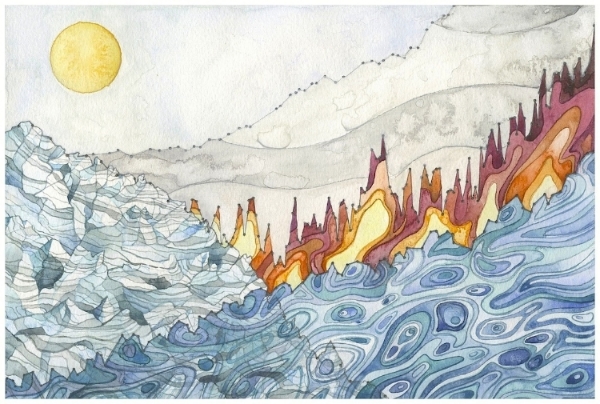Blogs
A) What is your vision for a sustainable world?
I see a sustainable world as one where we live together with the Earth and not off of it as we've been doing for a long time. We are used to take and take from the planet’s resources and when it comes to giving it back we only return the bad things we produce or don’t want anymore. You can see it everywhere, you can see it in the streets with all the papers and cars throwing CO2 in the atmosphere, in the rivers with all the chemicals that are thrown there and in the oceans with plastic bottles and plastic bags. We've been producing too much trash and that's a huge problem when almost none of it is biodegradable or end up in a proper landfill. Repairing these things would lead us to a more sustainable world.
B) What are you planning to do to make the vision a reality?
Fixing the trash issue is one the first steps we should take towards a more sustainable world. We don't need plastic bags, we don't need plastic bottles, we don't even need a lot of clothes. Throwing away all that we think we can’t use anymore isn’t good for the environment. We should reduce the amount of trash we produce. There's a movement called Zero-Waste, whose intentions are to reduce the amount of plastic trash we use and the waste of food or clothes as it is valid for waste in general, and I'm totally willing to give up plastic things such as packages, bags, bottles etc. There is 5 things to aim for in the Zero-Waste movement, the ‘’5 r’s’’ and these things are: Refuse, Reduce, Reuse, Recycle and Rot (composting). These things are not impossible to accomplish and we have a lot of examples as the movement is getting more strong with the help of social media now that the information is being widespread.
C) What impact has colonization had on our journey to a sustainable planet?
Since it's beginning colonization has caused huge impacts on colonized lands. As soon as the colonists got to America they started to explore the natives and the forests. They killed a lot of trees and got almost all our Pau Brasil abroad. When they started to produce sugar on the northeast of Brazil things got even worse as they deforested a good amount of land to plant sugarcane and with time the soil in the northeast started to lose its fertility and they deforested even more. The colonists believed in the infinity of nature so they didn't care at all. The soil in the northeastern part of Brazil got worse and worse and still ruined until this day. The deforestation in Brazil happened for a long time because of the need to produce primal material for the metropolis. The destruction of forests, local cultures, the mass murder of natives and African people were bad lessons for the country that was being built upon this land. We learned to take and take and not protecting our environment and we kept that. The years passed by and a lot has changed but we still exploring our planet in an uncontrolled way, taking everything we can from it. We got used to only make money out of the Earth and the people who are really making money out of it don't seem to care about the environmental issue. We've been destroying the planet for a long time but there's still time left for us to make a change! We still can start to use green energy, reforest, recycle more and watch our footprint, producing less trash and consuming less.
This is the image that captures some aspects of how I view climate change:
Landscape of change by Jill Pelto

Post comment
1 Comment(s)
Wellington, this is an incredibly thoughtful blog post, well done! Two things I really enjoyed: 1. Your in-depth explanation of colonization in Brazil. This is important as many people, including within our own countries, do not know our own histories of colonization. You also do a great job of making connections between that history and the continued exploitation of the earth. I would encourage you to think about strategies of resistance that have pushed back against this process both historically and currently. Indigenous people have acted as land stewards since before European contact and continue to fight for environmental justice and restoration. What groups are doing this in Brazil? What does this resistance look like?
I also really appreciate your image and the description. There are many ways we can imagine the impact of climate change and art is certainly one of them.
Keep up the good work!

Allison Bruce
Sep 21, 2017